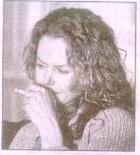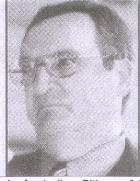
|
The Non Smokers' Movement of Australia | |||
|
Protecting the rights of the Non-smoking majority from
tobacco smoke and from the tobacco industry's propaganda. |
||||
| | Home Page | About | Publications | Newsletters | Fact Sheets | Campaigns | Search | | ||||
Issue 53, October - November 2005
|
Home Smokefree Home - every child deserves one
We wish to acknowledge the excellent work by Cancer Council, Australian Medical Association, Asthma Foundation and other organisations in encouraging smokers to go outdoors to create smokefree homes and cars, for the health, safety and comfort of children and other dependents. However, we know there are still far too many children and other dependents who are subjected to daily doses of the poisons in secondhand smoke. With the knowledge and publicity over the past decade about the dangers of passive smoking, we regard the act of smoking in cars and homes while children are present as blatant physical child abuse. We are aware of the dilemma faced by home- unit dwellers who, especially in warmer weather, are assaulted by secondhand smoke coming into their homes from smoking neighbours with smoke being allowed to drift directly into open windows, doorways and balconies of neighbouring residences. Non-smoking residents, whether they are owners or tenants, have a basic right to clean air in their own homes for their families, just as they expect clean water as well as protection from dangerous levels of noise. We are making available a series of sample Strata Corporation By-Laws for NSW, prepared by a solicitor who specialises in Strata Law. Members may use these by-laws with the proviso that they register them through our solicitor who prepared them on our behalf. We are prepared to provide financial support for the first Strata Owners Corporation/Body Corporate in each State in Australia which wishes to introduce a by-law restricting smoke from invading neighbouring residences. Please contact NSMA for copies of the relevant sample by-laws. Regarding freestanding homes invaded by tobacco-smoke from neighbours - we are willing to provide some financial support for families who wish to take legal action to protect their rights to clean air, free from the poisons in tobacco smoke. Celebrate a year of Smokefree Beaches !!!! Every body has the right to clean air, free from the poisons in Tobacco Smoke. Congratulations to those Councils which paved the way for clean beaches, one year ago, on 1st December 2004. This photo of NSMA Member with umbrella, appeared in the International "New Scientist" in August 2005 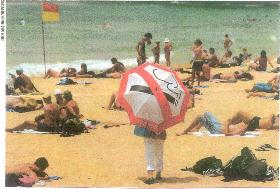
NSMA Member with Umbrella Editorial This edition of Non-Smokers' Movement of Australia's Clean Air Update is unfortunately very late due to pressing family health matters. I am delighted to report, following our Annual General Meeting held 1st November 2005 in Sydney, that our committee is as strong and supportive as ever, and wishes to continue the battle for every body's rights to clean air, free from the poisons in tobacco smoke. At the AGM, we heard (by proxy) from Sue Briscoe-Hough, a brave and feisty lady who suffers from Cystic Fibrosis and who, because of her body's intolerance to tobacco smoke, cannot even go to see her husband perform his music in clubs. She claims, quite rightly, that our Governments and the Hospitality Sector discriminate against her every day by continuing to allow smoking in hospitality venues. Our other guest speaker was NSMA Founder and Past President Brian McBride who presented a concept for licensing new smokers. (See details in this newsletter) This concept may seem radical, but the idea of licensing has much merit and falls well within the currently popular principle of "User pays". With youth smoking rates still far too high, we must consider every serious proposal. Other tobacco control experts undoubtedly have their own ideas, and should also put them forward. NSMA Annual Stinkies Awards
Book Report: Allen Carr's "EASYWAY to Stop Smoking", now into its 20th Anniversary Edition. Penguin Books. The author claims " If you follow my instructions, you will be happy to be a non- smoker for the rest of your life". The message in this book is quite repetitive but seems (according to talkback radio) to have helped many smokers to free themselves from their addiction to nicotine. News Around Australia 1. Celebrate New Year's Day in Tasmania where all indoor public places will at last be smokefree. From 1st January 2006, "a lot of people are going to breathe a lot easier" in the beautiful Apple Isle. Tasmania will have even more reason to promote itself as Australia's prime tourist destination - all public places will be smokefree indoors. We congratulate all involved in bringing about this long-awaited Public Health breakthrough. We wait with bated breath for all other Governments to act responsibly for all Australians by declaring all indoor public places smokefree. By ignoring our basic rights to clean air, they are acting discriminately, they are failing to uphold Occupational Health and Safety Law, and they are ignoring their Duty of Care. 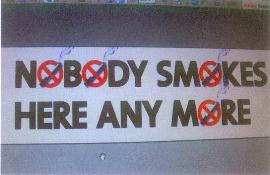
Non Smoking Poster For more information, or to complain about breaches of the law, call 1 800 671 738. 2. Burswood Casino, Western Australia - Despite an avalanche of protests from around Australia, the West Australian Premier and "Health Minister" have allowed the Packer-controlled casino to continue to discriminate against casino employees and non-smoking patrons by allowing tobacco smoke to poison the Casino's atmosphere. Burswood Management will need to keep a few "Packer Whacker" defibrillators (remember Kerry's 1990 revival) and some oxygen tanks handy in case of emergencies. A small price to pay to glean all that gambling gold from nicotine addicts. 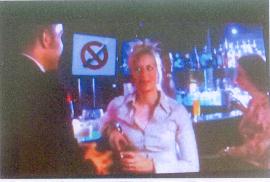
No Smoking at the Bar 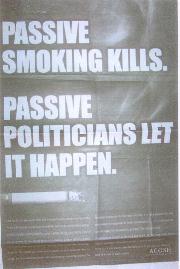
Passive Smoking and Politicians "West Australian" 21/9/05 3. South Australian bar worker, Phillip Edge In its "Health Dept" flyer of 2004, "Changes to non- smoking laws in pubs and clubs" the SA Government states "The health effects of passive smoking have become well known in recent years. Passive smoking can cause a number of serious illnesses including heart disease, lung cancer and nasal sinus cancer". Mr Edge (29), a non-smoker, recently won a three-year case against his employer for contracting cancer of the tongue from passive smoking in the workplace. He has difficulties with speech, eating and swallowing, and is scarred for life. He is speaking out to raise awareness among hospitality workers about the risks of passive tobacco smoke. (Story from "The Australian") We have written to his legal adviser, Kristie Molloy, offering congratulations on their win and further support if needed. 4. Smoking in Vehicles Several State Governments are considering legislation to specifically control smoking within a vehicle while children are present. More about smoking drivers in our next Clean Air Update. 5. It's Ten Years since the first Smoking Bans in Restaurants in Australia Ten years of smokefree dining should be a reason to celebrate Australian Capital Territory's groundbreaking legislation, but how can we do so when the ACT recently allowed the Hospitality Industry to plan for mostly enclosed (75%/25%) outdoor smoking areas when full indoor smoking eventually occurs? 6. Cancer Council Conference, held August 200 This conference was extremely informative and inspiring, and provided valuable advice for our members who attended, especially in regard to political activism. and media. NSMA Member Jim Grainda, who lost his voice as a result of a smoking-related stroke 14 years ago, attended the conference. He uses an electronic speaking device to communicate. 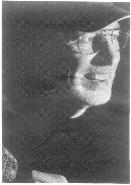
Jim Grainda 7. National Tobacco Control Conference, held Nov. 2005 With international speakers such as whistleblower Jeff Wigand who are legendary in the battle to control the scourge of tobacco's harm, this conference was also very inspiring. We will have a report from Steve Patroni in the next Newsletter. Brian McBride and current NSMA President Margaret Hogge attended the Conference dinner. 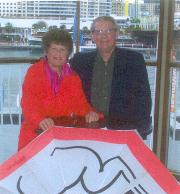
Margaret Hogge and Brian McBride The Tobacco Industry British American Tobacco (BAT) has, for 4 years, been secretly operating a factory in North Korea, in a joint venture with a state-owned corporation. (per SMH). Apparently BAT failed to mention the factory in its annual accounts. Imperial Tobacco's chief executive Gareth Davies is reported by Sharecast to have said "I am particularly pleased with the improvement in our cigarette volumes in the second half of the year, reversing the decline we saw in the first six months" Safer Cigarettes, as being developed by BAT, "designed to cut the risk of smoking-related diseases such as cancer and heart failure by up to 90%". Meanwhile, the pigs flying around at the time will have up to 100% chance of staying aloft. International News 1. China Ratifies Tobacco Treaty The Chinese Government has ratified the World Health Organisation's Framework Convention on Tobacco Control (FCTC). This means it formally supports the Treaty and agrees to ban tobacco sponsorship. 2. New Zealand Smokefree Workplaces: Smoking was banned in all indoor workplaces in NZ in December 2004. A 12-month report from the Asthma and Respiratory Foundation shows "smokefree hospitality venues have not resulted in an overall loss of profits in hospitality venues and do not appear to have affected employment or overseas visitor numbers" and "the legislation has strong public support, and compliance is high". 3. In Canada, the Supreme Court has ruled 9-0 that the government of British Columbia (and potentially other Canadian provinces) can sue tobacco companies, seeking damages to cover past and future health-care costs. 4. Studies from the Republic of Ireland, which introduced total indoor smoking bans in all workplaces in March 2004, show that in non-smoking barworkers, nicotine concentration in saliva declined much more quickly in the Republic (80%) than in Northern Ireland (not yet smokefree) (20%). 5. Fashion to die for at New York Fashion Week. 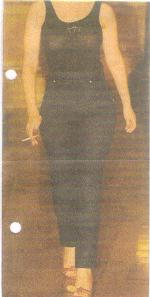
Gratuitous Tobacco Advert from the Sun Herald New Smokers Should Be Licenced This is a summary of talk by Brian McBride to NSMA Annual General Meeting on 1st November 2005. The article was previously written up in our Newsletter Update 31 in November 2001. This article is prompted by the Tobacco Control journal in May 2005 by Prof. Simon Chapman of Sydney University mentioning "the idea of a smoker licensing scheme". In 2001 400,000 Australian school children were experimenting with smoking each year and at least 100,000 in NSW taking up smoking on a regular basis and spending more than $36 million on these illicit purchases of tobacco. Governments were raking off millions in taxes which made them willing participants in the promotion of death and disease in our next generation. Health agencies did studies over six years in the nineties, which suggested that a licensing system for tobacco retailers would reduce teenage smoking by more than 30% by curbing the actions of sellers. The tragedy of all this is that a child who starts smoking at 14 years or younger is five times more likely to die of lung cancer than a person who starts aged 24, and 15 times more likely than someone who has never smoked. The health agencies were united in plugging for licensing of sellers so they had a more effective means of punishing those who sold cigarettes to minors. At NSMA, we felt that a campaign to introduce licensing of the consumers rather than the sellers would place a far more effective barrier in front of young persons thinking of taking up smoking. It would be more effective because it attacked the two major root causes of the problem. 1. It would raise awareness of the seriousness of the issue to a new level. Young people would not just drift into smoking their first cigarette as a casual decision taken very lightly. They would know there is a licensing process which they must go through and it is not as simple as just deciding to "give smoking a try". It would give them a legitimate defence against the very persuasive influence of peer pressure. Their eligibility to buy cigarettes would also become a matter of showing a license and hence their compliance would no longer be a matter of someone's judgement about their age. 2. It would help break the government's addiction to tobacco revenue by changing the nature of tobacco taxes and their impact on annual budgets. That is, the money in future would come from Licence fees paid annually by both new and continuing smokers instead of as a tax on every packet of cigarettes sold. The buzz word with government agencies is Tobacco Control, not prohibition, but control of the damage done by the industry. What better way to Control the problem than to Licence it. That gives a complete mechanism for identification of those involved and making sure that the User Pays all associated costs and is not subsidised by other taxpayers. The scheme would remove the incentive for government inaction by breaking their addiction to tobacco taxes. How Would It Work? Like drivers licences - Young people at 18 would apply for a licence to smoke in the same way they apply for a driver's licence. They would be given a Handbook of Essential Information on the dangers to themselves and their responsibilities to the community before they were let loose to inflict damage on society. They must be thoroughly tested on their knowledge of the dangers to health so they are "informed smokers". If they show ignorance or immaturity or have any special predisposition to the health dangers they should not be granted a licence until they rectify the condition. Ideally the process should require them to sign an indemnity stating they are prepared to forgo taxpayer funded medical services for smoking related diseases. But this may be a refinement to be added later after the principle of licensing is well established and accepted. Doctors would be required to notify the incidence of smoking related disease and it would be separately declared and paid for out a statutory fund much like workers compensation claims are handled out of insurance funds. The scheme would create a clear, unambiguous, restriction on young smokers which they could not easily ignore or get around for sustained periods of time. Funds Quarantined - This idea of quarantining all government income from taxes/licence fees would be an essential element of weaning government budgets off tobacco taxes. The money should be kept in a dedicated fund a bit like the old lotteries revenue was supposed to be spent only on hospitals. The idea is to make the tobacco industry revenue neutral to government budgets. What is more, the total money they receive from smoking should be spent on reducing the cost, or repairing the damage, to the nation of smoking related disease. This would fund a major increase in better education and more effective tobacco control. Of course there will be opposition to this because the politicians hate anything that reduces their flexibility to juggle funds in and out of consolidated revenue to suit their political agendas. The proposed scheme would make them more clearly accountable for what they are receiving and what they are spending on controlling the impact of smoking on the community. The doubters should be told that more radical approaches and a bit of lateral thinking can be very successful as shown by the funding of Quit Victoria. That radical scheme allocated a percentage of tobacco taxes to buying out and competing with tobacco companies in sponsorships and promotions and has proved extremely effective. When government budgets are no longer adversely affected by tobacco sales the Government might actually be persuaded to get serious about dismantling the industry so that it fades into insignificance at some time in the future. We can be sure this will never happen while tobacco taxes are such a central budget issue for the government. Licence Fees To Equal Tax Revenue Eventually. Licence fees should be calculated to replace lost tax sales revenue phased in over, say, ten years. E.g. If the average smoker normally pays $1000 per year on taxes on the product consumed then all smokers should pay an annual fee of $1000 so the revenues impact on both the government and the smoker is neutral. This of course means the cost of cigarettes would become much cheaper and this is certainly a worry. However, it would put the product back in its proper real value context as being a cheap rubbish product, preferably sold in a brown paper wrapper, which no one wants to sell or promote, instead of being the glamorous top dollar product in every glitzy supermarket, as it is now. Back in 2001/2 surveys showed that the top ten items purchased in your average supermarket were, Coca Cola, Longbeach Cigarettes, Winfield Cigs, Peter Jackson cigs, Horizon cigs, then at number six you start to get milk and bread etc. That is a total distortion of the consumer market caused by the disproportionate high tax regime on tobacco products. If the revenue is raised on consumer license fees instead of product sales that distortion will be removed. Hence cigarettes will no longer be a star product for supermarkets and they will have no incentive to facilitate their promotion. Some Will Not Get Licences There will always be the rebels, just as there are many unlicensed car drivers out there. But the majority will comply and the overall benefits will far outweigh the cost of compliance. Cost should never be an issue because it can be self-funding from the vast revenue available to the scheme. Make Them Realise The High Cost Is Not The Product. At present young smokers don't see the high component of tax and just think it is an expensive product and they will have to pay for their enjoyment just like every other expensive indulgence. However when they begin to realise it is really a cheap product with high government fees attached, hopefully, they won't be so happy to waste their hard earned money. Problems of Enforcement Critics will say it will be impossible to police the licensing system. However if revenue from fines for non- compliance are allowed to be collected and retained by local councils in the same way that they benefit from parking fines it would be a nice little revenue earner for them. I'm sure they would soon provide the necessary policing staff and strategies to make the system work effectively, particularly when a licence must be carried and shown for every purchase of tobacco products. It could be added to anti littering efforts where any person seen discarding a cigarette would provide a reason to be challenged to show their licence. Too Many Licences There will be some who will say we are over-governed by big brother requiring licences for everything etc., etc. These are nevertheless accepted as part of modern day living where you even require a licence for fishing. If there is a case for licensing and controlling a relatively harmless pursuit like fishing there must surely be a case for licensing and controlling the world's greatest cause of avoidable death and disease, with its devastating impact on non-users and on the cost of our health system. Tobacco has a stranglehold on our Hospitals. When "This is a smokefree site" means: "Smoke under the No-Smoking Signs" in full view of Patients, Staff, Visitors and Security Staff. When you visit a hospital, you usually see signs indicating that smoking is not allowed in the hospital grounds. We would appreciate hearing from readers who notice smoking bans are being adhered to, and that smoking bans are being enforced. Parents of new babies born in these "health centres" are forced to negotiate their way past smokers who blatantly ignore no-smoking signs. Hospital administrators and staff fail to protect these babies and families' rights to clean air, even in their first few minutes of life in the big outdoors. This situation is absolutely disgusting and disgraceful. 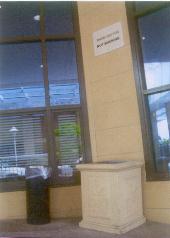
Ashtray in Non Smoking Area Example: A Private Hospital which prides itself in its facilities continues to provide a huge sandpit /ashtray directly below a No-Smoking sign. Smokers ignore the sign and stand directly under it to smoke and use the ashtray/sandpit. At another Private Hospital, construction workers and staff smoke outside sliding glass doors which suck in secondhand smoke whenever they open. Ashcans are provided in the central courtyard, so that cancer patients and even small children have smokers in full view whenever they walk past. We strongly suggest that all hospitals provide a Designated Outdoor Smoking Area only for patients with a medical dispensation. Staff and visitors should leave the hospital grounds before lighting up. 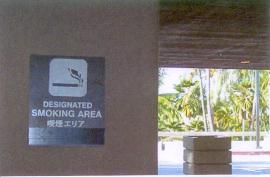
Honolulu Airport smoking area 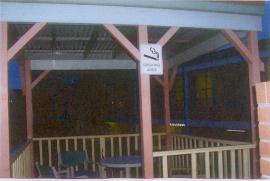
Ryde Hospital Smoking Area Designated Outdoor Smoking Areas as seen at Honolulu Airport and Royal Ryde Rehabilation Hospital (Right.) |

|
The Non-Smokers' Movement of Australia Inc, Box K860, Haymarket NSW 1240. | |||
| This page was last updated on 6th February, 2006. | ||||
| Home Page | Publications | Updates List | Top of Page | ||||
